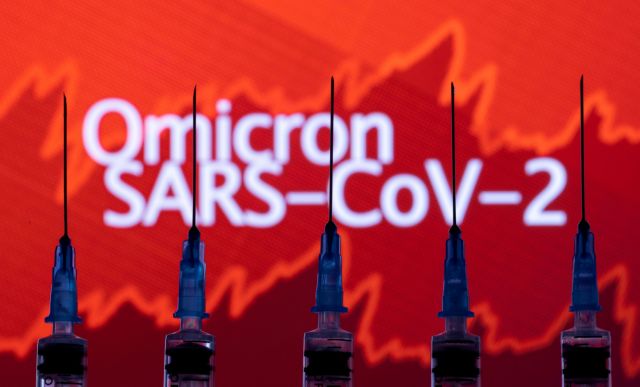The appearance of the new Omicron strain in South Africa, its high transmissibility, the large number of mutations and its rapid spread around the world have particularly worried scientists globally.
Data on the effectiveness of available vaccines are still early.
The Doctors of the Therapeutic Clinic of the Medical School of the National and Kapodistrian Athens Theodora Psaltopoulou, Panos Malandrakis, Giannis Danasis and Thanos Dimopoulos summarize three recent relevant publications in the prestigious international journal Nature.
Multiple mutations (37 to 15 in the spike region of the virus) of the strain in the spike region of the virus raise concerns about whether existing vaccines provide effective immunity to Omicron.
A study (doi: https://doi.org/10.1038/d41586-021-03826-3) showed that the new strain is resistant to the serum neutralization of people who had been ill, as well as the serum of people who had been vaccinated with one of the approved vaccines.
Even serum from subjects receiving booster doses had reduced neutralizing ability against the Omicron strain.
As for monoclonal antibodies, their effectiveness against the new strain is reduced, even those that have already been approved and administered.
Another study (doi: https://doi.org/10.1038/d41586-021-03824-5) after sequencing of the gene of the Omicron strain showed that it also requires the ACE2 receptor to infect human cells.
In serum samples from persons that were both vaccinated and fallen ill and those vaccinated alone, the neutralization of the Omicron strain provided by the vaccines was 22 times less than that of the original Wuhan strain.
In individuals who had become ill and received two doses of vaccine, the neutralization of the Omicron strain was equivalent to the neutralization provided only by the vaccine without a history of disease compared to the original strain of the virus.
Decreased immunity due to Omicron
In conclusion, this study concludes that although the immunity provided by vaccines is reduced, they certainly provide some protection especially with booster doses.
A third study (doi: https://doi.org/10.1038/d41586-021-03825-4), also published in the journal Nature, confirmed reduced efficacy against the Omicron variant, possibly exceeding the third dose.
Antibodies against the RBM region lost their in vitro potency for the Omicron strain, with only 3 of 29 retaining their efficacy (including ACE-2 mimetic antibody S2K146). Also other antibodies that do not target RBM were effective against the Omicron such as sotrovimab, SX259 and S2H97.
The escape of the micron strain from antibody protection is a key antigenic change in the evolutionary course of the SARS-CoV-2 virus. Therefore, it is particularly important to administer the third booster dose in conjunction with known protective measures, in order to limit the spread of the Omicront strain and in particular to prevent disease from it.

















![Ελαιόλαδο: Ανάκαμψη στην παραγωγή, πίεση στην κατανάλωση – Τι αλλάζει έως το 2035 [γραφήματα]](https://www.ot.gr/wp-content/uploads/2025/07/elaiolado.2023-1.jpg)























